Saturday, May 13, 2017
Nina Simone: She Cast a Spell and Made a Choice
Nina Simone: She Cast a Spell and Made a Choice
By Silverfoxx
When Nina Simone died quietly in her home in southern France on 21 April 2003, the spiritual essence of three generations of freedom fighters passed on to the otherworld the proverbial crossroads with her. With a voice that embodied the pain and power of the scattered African Diaspora and classic West African facial features that suggested a short distance between the Tyron, North Carolina of her birth and Ghana.
She was the voice of a movement. Deep blues, even darker hues, from the Delta to Dakar. When the old guard of the Civil Rights Movement talked about the “voice” of the movement, they always invoked Nina Simone, Ms. Simone to all those who couldn't wrap their minds around this woman, Black woman, protest woman, iconic woman, the one woman whose very voice summoned the spirits of the Middle Passage, of those under the overseer's lash, of that charred fruit hanging from southern trees, the sprits of blues whisperers, sacred singers, heavenly shouters and insatiable desires. This woman, Black woman, was the voice of a people.
In the early 1960s, Simone's music began to more directly echo the tenor of the times. Once the darling of the supper club set, Simone was more likely to be foundperforming at a Civil Rights fundraiser. It was because of her experiences with the movement that Simone wrote and recorded her most potent critique of American racism, “Mississippi Goddamn” She was dramatically moved by the bombing of the 16th Street Baptist Church in Birmingham, Alabama, which killed four little Black girls. Simone restrained her own rage and transformed it into the scathing political anthem, “Mississippi Goddamn”. The song was recorded live at Carnegie Hall in March of 1964. Simone's career and her access to the supper club set would be radically altered by the recording. The brilliance of the song lies in the way she initially destabilized the immediate reception of the song, by placing the song's lyrics on top of a swinging show tune beat as she speak truth to power.
“Alabama's got me so upset / Tennessee makes me lose my rest /
And everybody knows about Mississippi, Goddamn /
Don't tell me, I tell you /
Me and my people just about due /
I've been there so I know /
You keep on saying go slow”
Sister Nina Simone: Our Duty
Literally all of the mainstream protest music recorded by Black artists in the late 1960’s and early 1970s, like Sly and the Family Stone's “Thank You (Falletinme Be Mice Elf Agin)”, The Temptations' “Ball of Confusion”, Freda Payne's “Bring the Boys Home”, Roberta Flack's “Compared to What?,” Marvin Gaye's ‘What's Going On,” and Stevie Wonder's “Innervisions,” were indebted to “Mississippi Goddamn”. Simone would record other Black protest anthems like Billy Taylor's “I Wish I Knew How It Would Feel to be Free,” which had been a long-time favorite of protest marchers. As a Black woman, Simone also spoke to the burgeoning Black feminist movements.
Simone presented a portrait of Black femininity that spoke to various intersections of race, color, caste, sexuality, and gender. In the song “Four Women”, Simone discusses the different though linked realities of Aunt Sarah (“my skin is black…my hair is wooly, my back is strong”), Saphronia (“my skin is yellow, my hair is long. Between two worlds I do belong”), Sweet Thing (“My skin is tan, my hair in fine, my hips invite you . . .”), and Peaches (“My skin is brown, my manner is tough, I'll kill the first mother I see”). The four women represented the prevailing, controlling images of Black womanhood.
Nina Simone Why The King of Love Is Dead (live)
In the 1970’s a whole generation of Black youth were introduced to Simone via her classic “Young Gifted and Black”. For many people in the post-soul and hip-hop generation, their introduction to Simone’s music and songwriting came via hearing “Young, Gifted, and Black”, which became a mantra for the first generations to come of age after the Civil Rights era. Nina Simone was a messenger to our heart and conscience; there’s no telling how many lives she touched with the simple affirmation of the beauty of being “Young, Gifted, and Black”. The interest in Simone’s music by a generation of artists, largely born after her recording of “Mississippi Goddamn,” is just further evidence of the potency of her spirit. The title of Simone's autobiography, I Put a Spell on You, paid tribute to her rendition of the Screaming Jay Hawkins composition. In the hands of Simone, the song was transformed into a moment of high catharsis. Nina Simone put her own spell on us, one that serves those from the Delta to Dakar, and beyond, well into the future. She is and will forever be the ultimate songstress and storyteller of our times.
My skin is Black, My arms are long /
My hair is wooly, My back is strong /
Strong enough to take the pain / Afflicted again and again /
What do they call me?
— Nina Simone, “Four Women”
Nina Simone interviewed on The Wire
Nina Simone - Interview 1984
Nina Simone on Shock
A Sit Down with Nina Simone
Ifeyinwa portraying Nina Simone during an interview
Subscribe to:
Post Comments (Atom)
































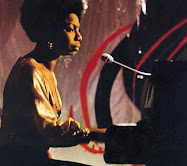

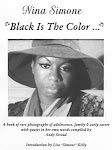

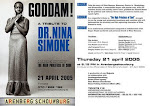

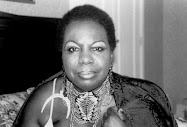






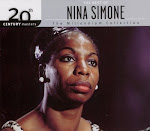



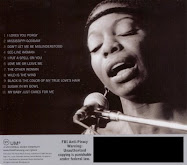
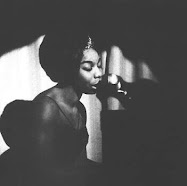

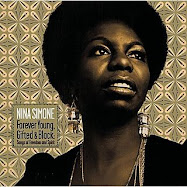









No comments:
Post a Comment